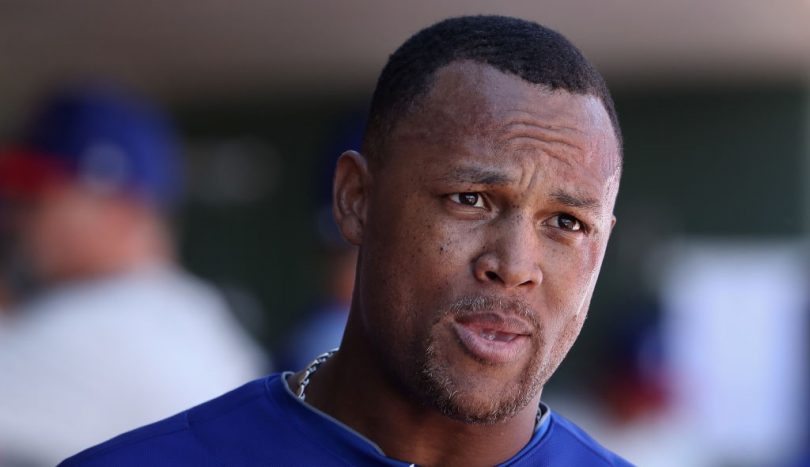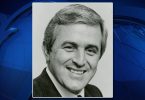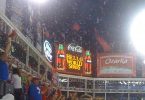Adrian Beltre formally retired from baseball on Friday morning, sitting through a half-hour valedictory news conference using the same principle that guided his 24-year professional career.
If you’re not having fun, you’re not doing it right.
There wasn’t the regret of Mantle, the anger of Ruth, or the stoicism of Ripken.
Instead it was a man at complete peace, the result of a mind and body in full harmony with the decision he made to step aside last week. On display was the personality that made him as loved and revered as any player to grace a big-league arena in Dallas-Fort Worth, regardless of sport.
That includes all the greats, from Staubach to Aikman to Emmitt to Pudge to Modano to Dirk.
The jocular needling with reporters and teammates in attendance, and the tongue-in-cheek back and forth was customary in the clubhouse.
It was all a continuation of the playful provocation he was renowned for. In fact, he pranked Jon Daniels last week, telling the general manager that instead of retiring he was actually signing with the Dodgers.
After letting him languish, Beltre let him off the hook.
“Nah, I’m retiring.”
There was no place for the flood of tears typical of these sorts of things.
“You want me to cry, to have sweaty eyes,” Beltre said. “I enjoy what I used to do. Inside, I still believe I can play. For me to think it’s just a sad day, no, I’m looking forward to being there for my family every day. [Daughter] Cassie is in high school; [son] A.J. is a year away. When am I going to see them grow up if not now? I’m excited about that. I’m really happy.”
It was an appropriate ending for a prolific, event-filled career that began 24 years ago as a 15-year-old. The signing of the Santo Domingo native turned out to have ramifications for the Dodgers, who were found to have intentionally violated international rules by signing Beltre a year before he was eligible.
It was discovered through a casual conversation with his agent, Scott Boras, who remarked to Beltre what an accomplishment it was to reach the major leagues by age 20.
Beltre replied that he was only 19.
As a result of that, major-league baseball tightened the oversight of international scouting, specifically in the Dominican Republic, and threw the book at the Dodgers.
Beltre’s career, of course, was of consequence. His Hall of Fame credentials are ironclad with numbers over a 20-year career that rate among the greats: 3,166 hits, 477 home runs and 1,707 RBIs.
The Rangers signed him as a free agent in 2011 to play third base for a World Series contender. The move irked Michael Young, who was moved from his position for a second consecutive year, this time going from third to a hybrid DH-utility role.
He hit a home run in the Rangers’ three-run seventh that gave Texas a 7-4 cushion in the ill-fated Game 6 of the 2011 World Series.
But he was adored for his personality. The playful give and take with shortstop Elvis Andrus was as legendary as all the achievements. He poked fun on the base paths. He exaggerated amusingly.
Who will forget moving the on-deck circle to adhere to an umpire’s demand that he be in it? Classic.
His quirks were storied.
He didn’t play with a cup because he didn’t like them, and he didn’t like people touching his head.
“It’s not just that he was such a great player,” said Eric Nadel, the Rangers’ radio broadcaster, who has observed every Rangers team since 1979. “He did it in a very unorthodox way. From the home runs from his knee, to throwing off-balance, even down to not wearing a cup and not liking people touch his head. He is also quirky but good-natured. That’s the thing that really made people love him so much.”
Beltre, Nadel continued, played with a smile on his face. So, too, did Pudge, Kirby Puckett and Ken Griffey Jr. Not a lot of guys do that.
On Friday, Beltre was reluctant to talk about his legacy.
He certainly has one, however, but it’s not merely in the ledgers of the stat keepers.
Rather, it’s the joy of the boyish charm with which he played.
So long, farewell, No. 29. Flit, float, fleetly flee, and go fly. The sun has gone to bed.
“I’m going to miss the game. That’s not even a question,” Beltre said. “I’m going to miss talking smack; baby-sitting guys, having those dinners, that interaction. Hopefully I don’t get over that quickly. It’s not easy to turn that switch. But it is time to move on and look forward to what’s coming ahead of me. I’m not going to get emotional because I’m happy with what I’m doing.”







